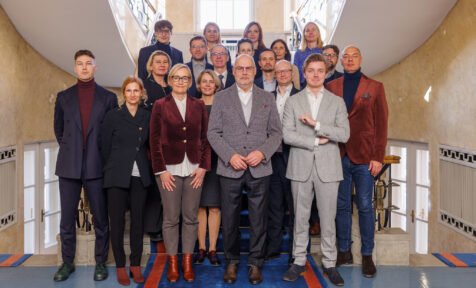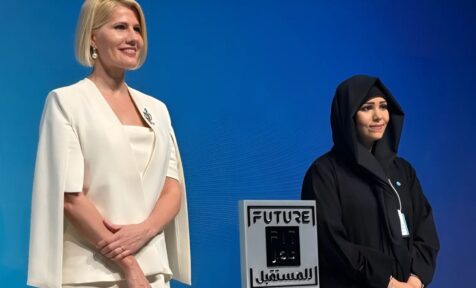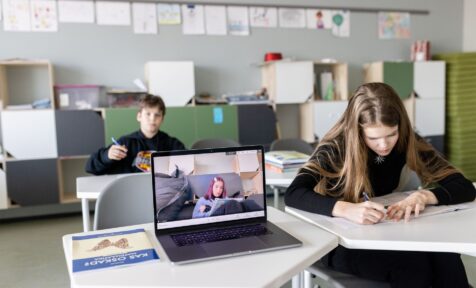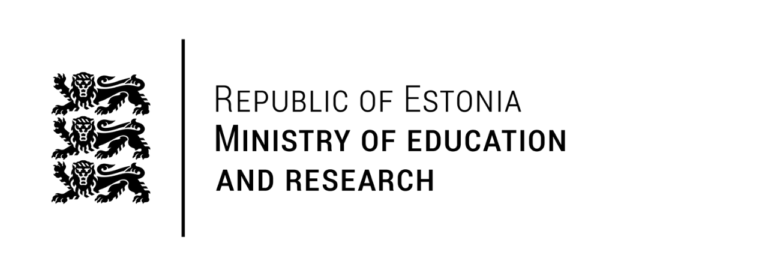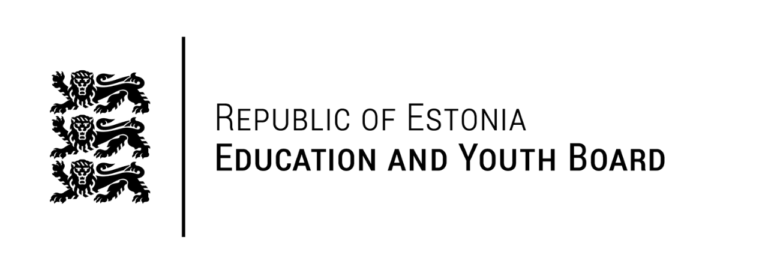Estonia is helping Moldova strengthen its first line of defense — not on the battlefield, but in the classroom.
Author: Marian Männi
Russia targets Ukraine with bullets, but Moldova is fighting them on another front, facing down weaponised misinformation. “We are at the frontline in the fight for freedom and democracy,” says Dan Perciun, Moldova’s 33-year-old Cambridge-educated minister of Education. He believes knowledge is the best defence against such misinformation, turning Moldova’s classrooms into another theatre of war.
Moldova’s performance on the 2022 PISA test shows the urgent need for reform. The country’s mathematics, reading, and science scores ranked below the OECD average; Perciun called the situation “alarming” in 2023.
Estonia as an inspiration
On the other hand, Estonia has a similar history yet consistently ranks among the top performers in the same tests. What can Moldova learn from its northern neighbour?
“Autonomy,” says Perciun. “We want to give more autonomy to each school, just like Estonia does.” He makes it clear that digitalisation, often presented as a panacea for educational reform, is not his primary focus. “Digitalisation for the sake of [digitalisation] won’t change anything,” he says. “It should be a tool, not the goal.”
In Estonia, schools can decide how to deliver the curriculum, resulting in innovative approaches that differ between schools. One school in Saaremaa uses design thinking, while another in Tallinn encourages peer teaching in math classes. Perciun has seen these approaches in person on visits to Estonia, and he aims to bring this culture of innovation and creativity to Moldova’s classrooms. He hopes this will shake up the traditional system by making learning more engaging and relevant.
Moldova’s education at a turning point
Despite the desire for change, Moldova’s education system still grapples with its Soviet legacy. A visit to the State University evokes the past with its cold, imposing halls and a wary receptionist. But the country’s future leaders walk these halls, leaders who will one day represent Moldova in international organisations and EU institutions.
This is where Estonian expertise comes into play. Estonian researchers from the University of Tartu have been working with Moldovan educators, PhD students, and master’s students as part of the EST4MORE project. Funded by the Estonian Centre for International Development (ESTDEV), the initiative combines online seminars with study visits to Estonia.
“The biggest limit to what you can achieve is often your imagination,” says Stefano Braghiroli, one of the project coordinators and an associate professor of European studies at the University of Tartu. He believes Moldova’s slow change in previous years is rooted in a fear of the unknown. “You may not like the current situation, but it’s stable,” he says.
Braghiroli considers education a powerful tool for societal change, and as Estonia has shown, what matters is not the appearance of the classrooms but the learning opportunities that lie within. “Estonia’s past is Moldova’s present,” he says. “And, hopefully, Estonia’s present will be Moldova’s future.”
Bold education reforms pay off
Braghiroli encourages Moldovans to embrace bold reforms, pointing to Estonia’s own transformation as proof that taking risks can pay off. His message to Moldova’s leaders? “Be brave!”
Sergiu Roadedeal and Madalina Zaporojan, students at Moldova’s State University studying for a bachelor’s in diplomacy and a master’s in European studies respectively, were inspired by their visit to Estonia. They were struck by Estonian students’ active role in transforming society and are eager to encourage Moldovan youth to become more engaged. They believe that Moldova, too, can embrace change. “We are the future,” says Roadedeal, “It’s up to us to shape our country.”
Braghiroli, too, sees these students as vital to Moldova’s future success. “[The project’s participants] are the main actors in Moldova’s transformation,” he says. “And they are more than welcome in the EU when the time comes.”
Estonia’s role in digital transformation
Anna Beitane, head of Digital Education Projects at the Johan Skytte Institute of Political Studies in Estonia, hopes Moldovan educators leave the programme understanding one essential message: there is more than one way to learn.
“Online learning makes education more accessible and flexible, offering opportunities to structure courses in innovative ways,” Beitane says. She emphasises the importance of adaptability, noting that the students involved in the project may well become Moldova’s first members of the European Parliament or the European Commission.
The EST4MORE project focuses on essential skills for modern educators, from designing interactive lessons to understanding copyright laws and best practices in education. “Sometimes people don’t take online courses seriously, but they can be very effective,” Beitane says. “They make learning more accessible, even on your phone.”
Moldova’s State University plays a pivotal role in this educational transformation. “If something good happens here, it can spread throughout the entire country,” says Braghiroli, highlighting the potential for positive change to ripple out from the university.
Augustin Zapuhlih, a PhD student at Moldova’s State University, sees the evolution of research in Moldova as a mirror of the country’s European integration process. “It reflects the steps Moldova is taking towards Europe,” he says, highlighting the role of education in this broader transformation.
Similarly, Valentina Teosa, a professor of international relations, emphasises that Moldova needs specialists in European integration. “The level of knowledge on European integration here isn’t the highest, but we are eager to improve,” she says. “This project has helped us prepare for a better future.”
Moldova’s education system is undergoing significant change, driven by the efforts of young people, educators, and international partnerships. With the right mindset and willingness to embrace transformation, the future of Moldovan education looks ready for a sea change.
